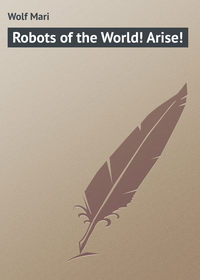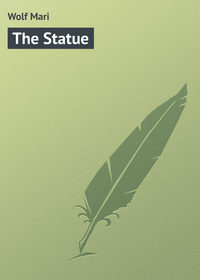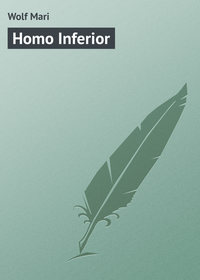 полная версия
полная версияThe First Day of Spring

Mari Wolf
The First Day of Spring
Here is a love story of two young people who met under the magic of festival time. One was Trina, whose world was a gentle make-believe Earth. The other was Max, handsome spaceman, whose world was the infinite universe of space…
The First Day of spring, the man at the weather tower had said, and certainly it felt like spring, with the cool breeze blowing lightly about her and a faint new clover smell borne in from the east. Spring – that meant they would make the days longer now, and the nights shorter, and they would warm the whole world until it was summer again.
Trina laughed aloud at the thought of summer, with its picnics and languid swims in the refilled lakes, with its music and the heavy scent of flowers and the visitors in from space for the festival. She laughed, and urged her horse faster, out of its ambling walk into a trot, a canter, until the wind streamed about her, blowing back her hair, bringing tears to her eyes as she rode homeward toward the eastern horizon – the horizon that looked so far away but wasn't really.
"Trina!"
His voice was very close. And it was familiar, though for a moment she couldn't imagine who it might be.
"Where are you?" She had reined the horse in abruptly and now looked around her, in all directions, toward the north and south and east and west, toward the farm houses of the neighboring village, toward the light tower and the sun tower. She saw no one. No one else rode this early in the day in the pasture part of the world.
"I'm up here, Trina."
She looked up then and saw him, hovering some thirty feet off the ground in the ridiculous windmill-like craft he and his people used when they visited the world.
"Oh, hello, Max." No wonder she had known the voice. Max Cramer, down from space, down to the world, to see her. She knew, even before he dropped his craft onto the grass beside her, that he had come to see her. He couldn't have been on the world for more than the hour she'd been riding.
"You're visiting us early this year, Max. It's not festival time for three months yet."
"I know." He cut the power to the windmill blades, and they slowed, becoming sharply visible. The horse snorted and backed away. Max smiled. "This world is very – attractive."
His eyes caught hers, held them. She smiled back, wishing for the hundredth time since last summer's festival that he were one of her people, or at least a worldling, and not a man with the too white skin of space.
"It may be attractive," she said. "But you always leave it soon enough."
He nodded. "It's too confining. It's all right, for a little while, but then…"
"How can you say that?" She shook her head sadly. Already they were arguing the same old unresolvable argument, and they had scarcely greeted each other. After all his months in space they met with the same words as they had parted. She looked past him, up and out, toward the horizon that seemed so many miles away, toward the morning sun that seemed to hang far, far off in the vaulted blue dome of the sky.
"How can you even think it? About this?"
His lips tightened. "About this," he repeated. "A horizon you could ride to in five minutes. A world you could ride around in two hours. A sun – you really call it a sun – that you could almost reach up and pluck out of that sky of yours." He laughed. "Illusions. World of illusions."
"Well, what do you have? A ship – a tiny ship you can't get out of, with walls you can see, all around you."
"Yes, Trina, with walls we can see."
He was still smiling, watching her, and she knew that he desired her. And she desired him. But not the stars.
"You have nothing like this," she said, knowing it wouldn't do any good. She looked past him at the light tower, one of the many that formed the protective screen about her world, that made it seem great and convex, a huge flattened sphere with the sun high above, and not the swift curving steel ball that it actually was.
This was her world. It was like Earth, like the old Earth of the legends of the time before the radiation wars. And even though her mind might know the truth about the screens that refracted light and the atomic pile that was her sun, her heart knew a more human truth. This was a world. As it had been in the beginning. As it must be till the end – or until they found a new Earth, somewhere, sometime… Max sighed. "Yes, you have your world, Trina. And it's a good one – the best of its kind I've ever visited."
"Why don't you stay here then?"
A spaceman, she thought. With all the dozens of men in my world, why did it have to be a spaceman? With all the visitors from New France and New Chile and New Australia last festival, why did it have to be him?
"I have the stars, Trina."
"We do too!" Last festival, and the warm June night, heavy, druggedly heavy with honeysuckle and magnolia, and the hidden music from the pavillions. And Max Cramer, tall and strong boned and alien, holding her in his arms, dancing her away from her people, out onto the terrace above the little stream, beneath the full festival moon and the summer stars, the safe, sane, well ordered constellations that their ancestors had looked upon from Earth.
"My stars are real, Trina."
She shook her head, unable to argue with him. World-woman and spaceman, and always different, with nothing in common between them, really, except a brief forgetfulness at festival time.
"Come with me, Trina."
"No." She gathered up the reins and chucked at the horse and turned, slowly, for the village.
"You wouldn't come – for me?"
"You wouldn't stay, would you?"
She heard the windmill blades whir again, and a rustling of wind, and then he was beside her, skimming slowly along, barely off the ground, making her horse snort nervously away.
"Trina, I shouldn't tell you this, not until we've met with your councilmen. But I – I've got to."
He wasn't smiling now. There was a wild look about his face. She didn't like it.
"Captain Bernard's with the council now, giving them the news. But I wanted to see you first, to be the one who told you." He broke off, shook his head. "Yet when I found you I couldn't say anything. I guess I was afraid of what you'd answer…"
"What are you talking about?" She didn't want to look at him. It embarrassed her somehow, seeing him so eager. "What do you want to tell me?"
"About our last trip, Trina. We've found a world!"
She stared at him blankly, and his hand made a cutting gesture of impatience. "Oh, not a world like this one! A planet, Trina. And it's Earth type!"
She wheeled the horse about and stared at him. For a moment she felt excitement rise inside of her too, and then she remembered the generations of searching, and the false alarms, and the dozens of barren, unfit planets that the spacemen colonized, planets like ground-bound ships.
"Oh, Trina," Max cried, "This isn't like the others. It's a new Earth. And there are already people there. From not long after the Exodus…"
"A new Earth?" she said. "I don't believe it."
The council wouldn't either, she thought. Not after all the other new Earths, freezing cold or methane atmosphered or at best completely waterless. This would be like the others. A spaceman's dream.
"You've got to believe me, Trina," Max said. "And you've got to help make the others believe. Don't you see? You wouldn't live in space. I wouldn't live here – on this. But there, on a real planet, on a real Earth…"
Then suddenly she felt his excitement and it was a part of her, until against all reason she wanted to believe in his mad dream of a world. She laughed aloud as she caught up the reins and raced her horse homeward, toward the long vista of the horizon and the capital village beyond it, ten minutes gallop away.
Max and Trina came together into the council hall and saw the two groups, the roomful of worldmen and the half dozen spacemen, apart from each other, arguing. The spacemen's eyes were angry.
"A world," Captain Bernard said bitterly, "there for your taking, and you don't even want to look at it."
"How do we know what kind of world it is?" Councilman Elias leaned forward on the divan. His voice was gentle, almost pitying. "You brought no samples. No vegetation, no minerals…"
"Not even air samples," Aaron Gomez said softly. "Why?"
Bernard sighed. "We didn't want to wait," he said. "We wanted to get back here, to tell you."
"It may be a paradise world to you," Elias said. "But to us…"
Max Cramer tightened his grip on Trina's hand. "The fools," he said. "Talking and talking, and all the time this world drifts farther and farther away."
"It takes so much power to change course," Trina said. "And besides, you feel it. It makes you heavy."
She remembered the stories her father used to tell, about his own youth, when he and Curt Elias had turned the world to go to a planet the spaceman found. A planet with people – people who lived under glass domes, or deep below the formaldehyde poisoned surface.
"You could be there in two weeks, easily, even at your world's speed," Captain Bernard said.
"And then we'd have to go out," Elias said. "Into space."
The worldmen nodded. The women looked at each other and nodded too. One of the spacemen swore, graphically, and there was an embarrassed silence as Trina's people pretended not to have heard.
"Oh, let's get out of here." The spaceman who had sworn swore again, just as descriptively, and then grinned at the councilmen and their aloof, blank faces. "They don't want our planet. All right. Maybe New Chile…"
"Wait!" Trina said it without thinking, without intending to. She stood speechless when the others turned to face her. All the others. Her people and Max's. Curt Elias, leaning forward again, smiling at her.
"Yes, Trina?" the councilman said.
"Why don't we at least look at it? Maybe it is – what they say."
Expression came back to their faces then. They nodded at each other and looked from her to Max Cramer and back again at her, and they smiled. Festival time, their eyes said. Summer evenings, summer foolishness.
And festival time long behind them, but soon to come again.
"Your father went to space," Elias said. "We saw one of those worlds the spacemen talk of."
"I know."
"He didn't like it."
"I know that too," she said, remembering his bitter words and the nightmare times when her mother had had so much trouble comforting him, and the winter evenings when he didn't want even to go outside and see the familiar, Earth encircling stars.
He was dead now. Her mother was dead now. They were not here, to disapprove, to join with Elias and the others.
They would have hated for her to go out there.
She faltered, the excitement Max had aroused in her dying away, and then she thought of their argument, as old as their desire. She knew that if she wanted him it would have to be away from the worlds.
"At least we could look," she said. "And the spacemen could bring up samples. And maybe even some of the people for us to talk to."
Elias nodded. "It would be interesting," he said slowly, "to talk to some new people. It's been so long."
"And we wouldn't even have to land," Aaron Gomez said, "if it didn't look right."
The people turned to each other again and smiled happily. She knew that they were thinking of the men and women they would see, and all the new things to talk about.
"We might even invite some of them up for the festival," Elias said slowly. "Providing they're – courteous." He frowned at the young spaceman who had done the swearing, and then he looked back at Captain Bernard. "And providing, of course, that we're not too far away by then."
"I don't think you will be," Bernard said. "I think you'll stay."
"I think so too," Max Cramer said, moving closer to Trina. "I hope so."
Elias stood up slowly and signalled that the council was dismissed. The other people stood up also and moved toward the doors.
"We'd better see about changing the world's course," Aaron Gomez said.
No one objected. It was going to be done. Trina looked up at Max Cramer and knew that she loved him. And wondered why she was afraid.
It was ten days later that the world, New America, came into the gravitational influence of the planet's solar system. The automatic deflectors swung into functioning position, ready to change course, slowly and imperceptibly, but enough to take the world around the system and out into the freedom of space where it could wander on its random course. But this time men shunted aside the automatic controls. Men guided their homeland in, slowly now, toward the second planet from the sun, the one that the spacemen had said was so like Earth.
"We'll see it tomorrow," Trina said. "They'll shut off part of the light tower system then."
"Why don't they now?" Max Cramer asked her. It was just past sunset, and the stars of a dozen generations ago were just beginning to wink into view. He saw Venus, low on the horizon, and his lips tightened, and then he looked up to where he knew the new sun must be.
There was only the crescent of Earth's moon.
"Now?" Trina said. "Why should they turn the screens off now? We're still so far away. We wouldn't see anything."
"You'd see the sun," Max said. "It's quite bright, even from here. And from close up, from where the planet is, it looks just about like Earth's."
Trina nodded. "That's good," she said, looking over at the rose tints of the afterglow. "It wouldn't seem right if it didn't."
A cow lowed in the distance, and nearer, the laughing voices of children rode the evening breeze. Somewhere a dog barked. Somewhere else a woman called her family home to supper. Old sounds. Older, literally, than this world.
"What are the people like, out there?"
He looked at her face, eager and worried at the same time, and he smiled. "You'll like them, Trina," he said. "They're like – well, they're more like this than anything else."
He gestured, vaguely, at the farmhouse lights ahead of them, at the slow walking figures of the young couples out enjoying the warm spring evening, at the old farmer leading his plow horse home along the path.
"They live in villages, not too different, from yours. And in cities. And on farms."
"And yet, you like it there, don't you?" she said.
He nodded. "Yes, I like it there."
"But you don't like it here. Why?"
"If you don't understand by now, Trina, I can't explain."
They walked on. Night came swiftly, crowding the rose and purple tints out of the western sky, closing in dark and cool and sweet smelling about them. Ahead, a footbridge loomed up out of the shadows. There was the sound of running water, and, on the bank not far from the bridge, the low murmuring of a couple of late lingering fishermen.
"The people live out in the open, like this?" Trina said.
"Yes."
"Not underground? Not under a dome?"
"I've told you before that it's like Earth, Trina. About the same size, even."
"This is about the same size, too."
"Not really. It only looks that way."
The fishermen glanced up as they passed, and then bent down over their lines again. Lucas Crossman, from Trina's town, and Jake Krakorian from the southern hemisphere, up to visit his sister Lucienne, who had just had twins…
Trina said hello to them as she passed, and found out that the twins looked just like their mother, except for Grandfather Mueller's eyes, and then she turned back to Max.
"Do people live all over the planet?"
"On most of it. The land sections, that is. Of course, up by the poles it's too cold."
"But how do they know each other?"
He stopped walking and stared at her, not understanding for a minute. Girl's laughter came from the bushes, and the soft urging voice of one of the village boys. Max looked back at the fishermen and then down at Trina and shook his head.
"They don't all know each other," he said. "They couldn't."
She thought of New Chile, where her cousin Isobelle was married last year, and New India, which would follow them soon to the planet, because Captain Bernard had been able to contact them by radio. She thought of her people, her friends, and then she remembered the spacemen's far flung ships and the homes they burrowed deep in the rock of inhospitable worlds. She knew that he would never understand why she pitied the people of this system.
"I suppose we'll see them soon," she said. "You're going to bring some of them back up in your ship tomorrow, aren't you?"
He stood quietly, looking down at her. His face was shadowed in the gathering night and his whole body was in shadow, tall and somehow alien seeming there before her.
"Why wait for them to come here, Trina?" he said. "Come down with us, in the ship, tomorrow. Come down and see for yourself what it's like."
She trembled. "No," she said.
And she thought of the ship, out away from the sky, not down on the planet yet but hanging above it, with no atmosphere to break the blackness, to soften the glare of the planet's sun, to shut out the emptiness.
"You'd hardly know you weren't here, Trina. The air smells the same. And the weight's almost the same too. Maybe a little lighter."
She nodded. "I know. If we land the world, I'll go out there. But not in the ship."
"All right." He sighed and let go his grip on her shoulders and turned to start walking back the way they had come, toward the town.
She thought suddenly of what he had just said, that she would hardly be able to tell the difference.
"It can't be so much like this," she said. "Or you couldn't like it. No matter what you say."
"Trina." His voice was harsh. "You've never been out in space, so you couldn't understand. You just don't know what your world is like, from outside, when you're coming in."
But she could picture it. A tiny planetoid, shining perhaps behind its own screens, a small, drifting, lonely sphere of rock. She trembled again. "I don't want to know," she said.
Somewhere in the meadows beyond the road there was laughter, a boy and a girl laughing together, happy in the night. Trina's fingers tightened on Max's hand and she pulled him around to face her and then clung to him, trembling, feeling the nearness of him as she held up her face to be kissed.
He held her to him. And slowly, the outside world of space faded, and her world seemed big and solid and sure, and in his arms it was almost like festival time again.
At noon the next day the world slowed again and changed course, going into an orbit around the planet, becoming a third moon, nearer to the surface than the others.
The people, all of those who had followed their normal day-to-day life even after New America came into the system, abandoned it at last. They crowded near the television towers, waiting for the signal which would open up some of the sky and show them the planet they circled, a great green disk, twice the apparent diameter of the legendary Moon of Earth.
Max stood beside Trina in the crowd that pressed close about his ship. He wore his spaceman's suit, and the helmet was in his hand. Soon he too would be aboard with the others, going down to the planet.
"You're sure you won't come, Trina? We'll be down in a couple of hours."
"I'll wait until we land there. If we do."
Curt Elias came toward them through the crowd. When he saw Trina he smiled and walked faster, almost briskly. It was strange to see him move like a young and active man.
"If I were younger," he said, "I'd go down there." He smiled again and pointed up at the zenith, where the blue was beginning to waver and fade as the sky screens slipped away. "This brings back memories."
"You didn't like that other world," Trina said. "Not any more than Father did."
"The air was bad there," Elias said.
The signal buzzer sounded again. The center screens came down. Above them, outlined by the fuzzy halo of the still remaining sky, the black of space stood forth, and the stars, and the great disk of the planet, with its seas and continents and cloud masses and the shadow of night creeping across it from the east.
"You see, Trina?" Max said softly.
The voices of the people rose, some alive with interest and others anxious, fighting back the planet and the unfamiliar, too bright stars. Trina clutched Max Cramer's hand, feeling again the eagerness of that first day, when he had come to tell her of this world.
"You're right," she whispered. "It is like Earth."
It was so much like the pictures, though of course the continents were different, and the seas, and instead of one moon there were two. Earth. A new Earth, there above them in the sky.
Elias let out his breath slowly. "Yes," he said. "It is. It's not a bit like that world we visited. Not a bit."
"When you're down there it's even more like Earth," Max said. "And all the way down you could watch it grow larger. It wouldn't be at all like open space."
At the poles of the planet snow gleamed, and cloud masses drifted across the equator. And the people looked, and pointed, their voices growing loud with eagerness.
"Why don't we land the world now?" Trina cried. "Why wait for the ship to bring people up here?"
"Landing the world would take a lot of power," Elias said. "It would be foolish to do it unless we planned on staying for quite a while." He sighed. "Though I would like to go down there. I'd like to see a really Earth type planet."
He looked at Max, and Max smiled. "Well, why not?" he said.
Elias smiled too. "After all, I've been in space once. I'll go again." He turned and pushed his way through the people.
Trina watched him go. Somehow he seemed a symbol to her. Old and stable, he had been head of the council since she was a child. And he had gone into space with her father…
"Please come, Trina," Max said. "There's nothing to be afraid of."
With both Max and Elias along, certainly it couldn't be too bad. Max was right. There was nothing, really, to be afraid of. She smiled up at him.
"All right," she said. "I'll go."
And then she was walking with Max Cramer toward the ship and trying not to remember her father crying in his sleep.
The ship rose, and Trina cried out as she felt the heaviness wrench her back against the cushions. Max reached over to her. She felt the needle go into her arm again, and then sank back into the half sleep that he had promised would last until they were ready to land.
When she awoke the planet was a disk no longer, but a great curving mass beneath the ship, with the mountains and valleys and towns of its people plainly visible. But the planet's sky still lay below, and around them, in every direction except down, space stretched out, blacker than any night on the world. The world. Trina moaned and closed her eyes, glad she hadn't seen it, somewhere tiny and insignificant behind them.
Max heard her moan and reached toward her. She slept again, and woke only when they were down and he was tugging the straps loose from around her. She sat up, still numbed by the drug, still half asleep and unreal feeling, and looked out about her at the planet's surface.
They were in a field of some sort of grain. Beyond the scorched land where they had come down the tall cereal grasses rippled in the soft wind, a great undulating sea of green, reaching out toward the far off hills and the horizon. Cloud shadows drifted across the fields, and the shadow of the ship reached out to meet them.
Trina rubbed her eyes in wonder.
"It is like the world," she said. "Just like it."
For a moment she was sure that they were back on the world again, in some momentarily unrecognized pasture, or perhaps on one of the sister worlds. Then, looking along the row of hills to where they dropped away into an extension of the plain, she saw that the horizon was a little too far, and that the light shimmered differently, somehow, than on her home. But it was such a little difference.
"Come on outside," Max Cramer said. "You'll be all right now."
She stood up and followed him. Elias was already at the airlock, moving unsteadily and a little blankly, also still partly under the influence of the narcotic.






